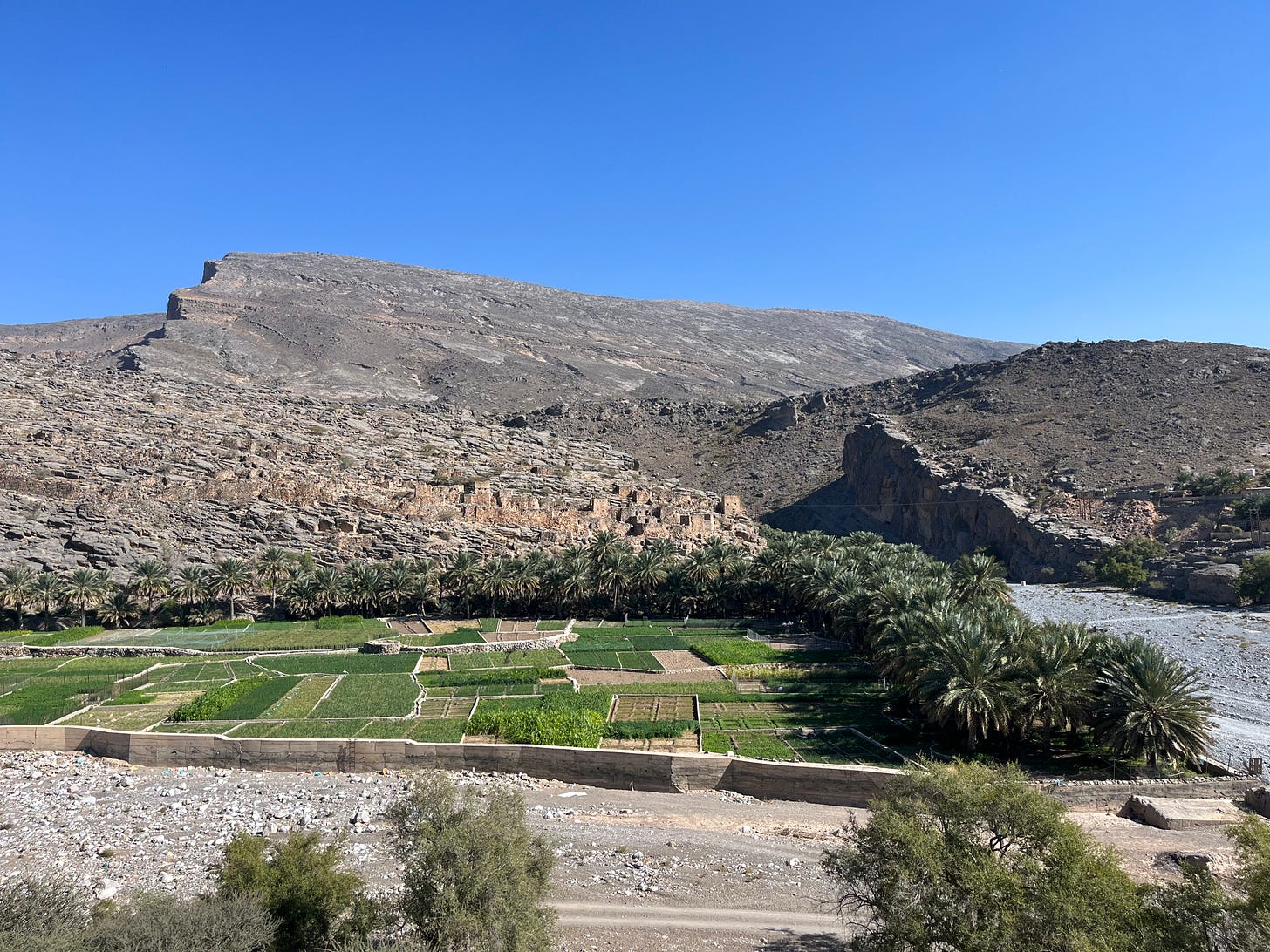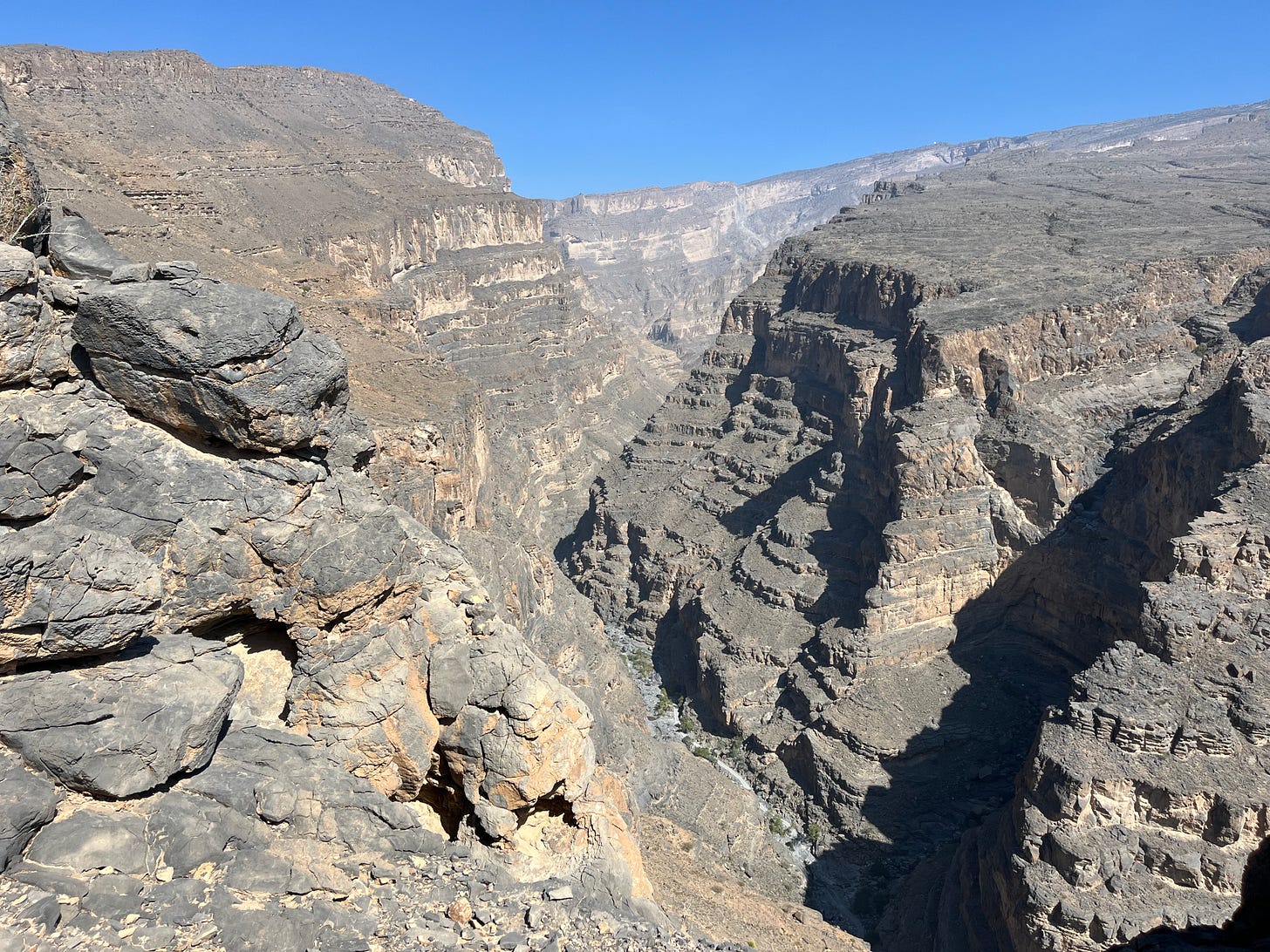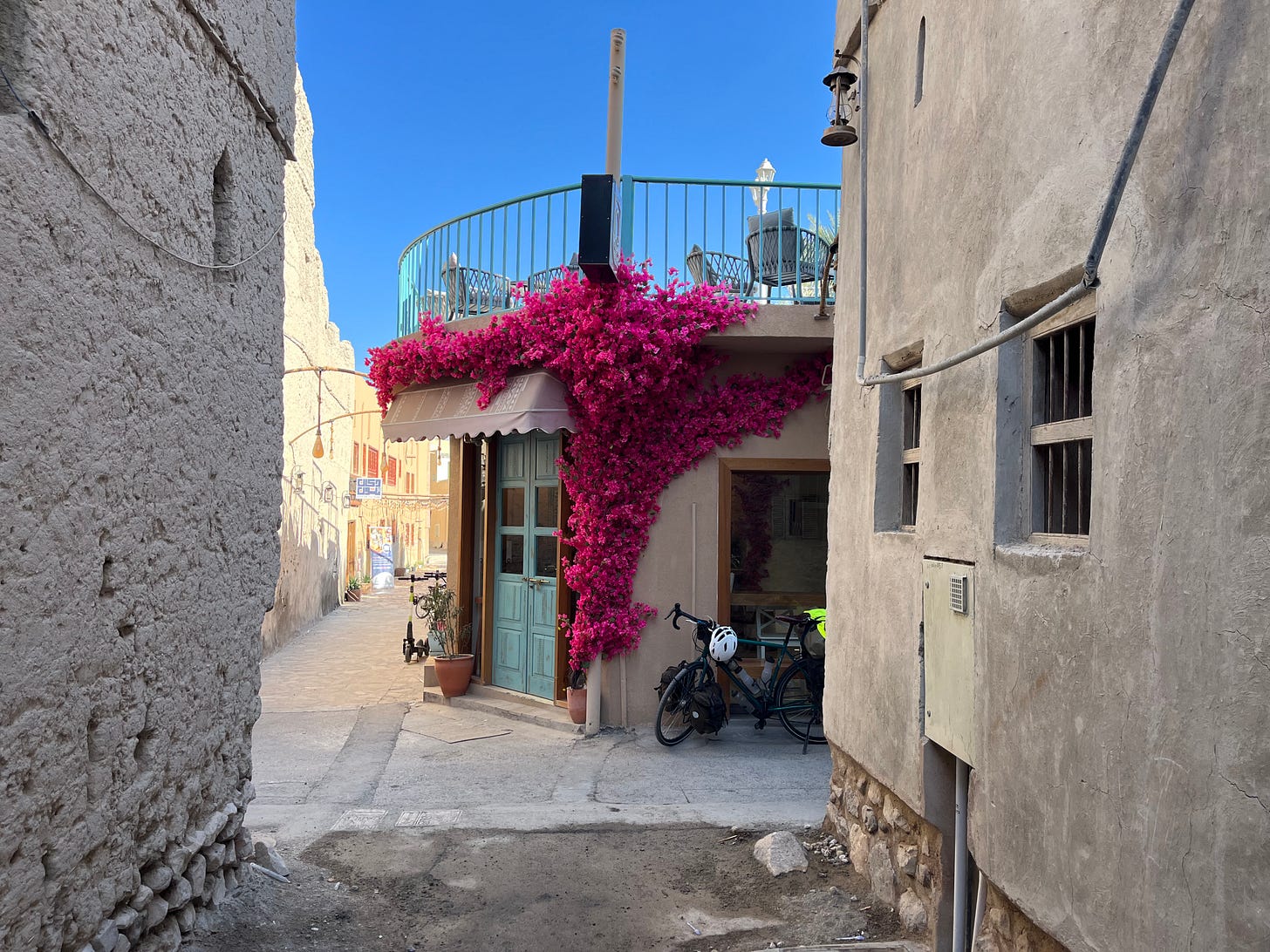170 | I turned thirty
Al Hamra, Oman
I had planned to hike the Wadi Ghul, a dry riverbed, and had locked my bicycle with some Omani carpet salesmen, their carpets strung along the roadside like dirty laundry. But the wadi was at first one and then suddenly five hundred metres below me. I am headed the wrong way, I noted. Beneath, ever-smaller tourists drove four-by-fours among the shade of the palms, yet there was no shade high on the ridge. Curiously, as I climbed, the breeze stopped and the heat pounded. I had mistakenly walked route W6b, not W6a, but continued up among those Jurassic mountains, bare and uninhabited.
At the top of some mountain, after a few hours, I heard chatter—Polish? Yes, Polish voices—coming towards me and complaining about the length of their hike.
Chris is forty-six and broad with three-quarter-length baggy beige trousers. He wears winter hiking socks made of green wool and has a black t-shirt wrapped around his head. Chris hates Russia and loves Poland and his children are exhausted; they steal shade from even the limpest bush. They’ve already hiked for four hot hours.
Realising that I’ll never reach the wadi on my trajectory, I turn around and walk with them. Chris and I slip into conversation.
Chris believes in astrology. His wife “puts up” with his beliefs, his children don’t know about them, and he never mentions astrology to his friends. But to me—a stranger on a mountain—Chris is himself.
Astrology saved Chris’s life. He has difficult energies, he tells me; he doesn’t love himself. Before astrology, the emotions he felt were his alone to cope with. Although he doesn’t say it directly, I think he was once an angry man. But today he can not be more kind and open about his celestial interest. He has determined, with the help of astrology, that the energies he feels rising within him are for objective observation and not for some big reaction. Now Chris realises that his negative energies—those “difficult” ones—arise from the stars and return to them if left alone.
Chris stops walking. I stop, too. He holds his broad hand flat six inches from my stomach and I close my eyes and he feels my energy. His son stares for a moment, shrugs and keeps walking. Then Chris opens his phone, and shows me a couple of star charts. Then he pauses and says, “You probably think this is all very silly…”
Looking Chris in the eye, I tell him categorically I do not think it is silly. I say there is nothing ridiculous about seeking to understand the world at a deeper level, and—if these things can be compared, which they probably shouldn’t—his belief is not more silly than splashing water on a baby’s head or praying in a particular direction, or repeating a mantra or reading the residue in the bottom of a cup of Turkish coffee, or eating bread and sipping wine, or asking an octopus in a tank.
After talking with Chris, I headed down the mountain. In the valley’s quiet, I reflect that there is no reasonable explanation for what happened to me over the last thirty years. What on earth is going on? This great expanse of colour and shape and sound and raw existence, and me—a silent centreless observer—in the middle of it all.
Science provides excellent explanations for many things. Yet it’s silent on the most essential questions, the spiritual “mysteries”. Why are we conscious? Where does life come from? Are we alone in the universe? And so on.
And even if we discover—by some miracle—that we are within a computer or put here by a god or a product of randomness, we will be left wondering who built the computer, what made god, or what began the randomness. If the universe does, in fact, expand and contract ad infinitum, as many believe, we’ll be left begging “into and out of what” do we expand? And finally, we will continue to ask, why am I me and why are you you and why do I wake up as me every morning?
Well, as usual, this morning I woke up as Me, only this time I was thirty. Being thirty had always sounded like a vast number, an adult’s age in a way that being twenty-one was not. Now that I’m thirty, it sounds young and innocent. (Even forty sounds pretty young)—it’s funny how that happens.
Wadi Ghul is ten kilometres west of Al Hamra’s old town. In Al Hamra, when the sun sets, the cicadas begin, hidden at the feet of the date palms. Their electric sounds are broken up by toads burping. The toads live in the shallow irrigation channels that dissect the palms into small fields; beneath the trees, each field is planted with grasses and spring onions, cut and pulled up many times a year by the Pakistani and Bengali workmen.
Mountains surround us and cast dark shadows against the fresh blue-grey skies. Although it’s hot in the mountains, it’s cool among these date palms. As I walk, I follow the silent flowing water on the raised paths and the palm trees stick out from the earth like the tails of buried lizards, with wooden scales stacked like clay tiles, swaying as if burrowing. The tip of each tail bursts into a green fractal firework; weightless moss-green ferns reach high into that unbroken and darkening sky.
I write from the old town, a cluster of dilapidated mud houses along the edge of the palm fields. I can hear the yelp of a kid goat looking for her mother.
In my twenties, I learned that we are essentially mimetic animals; we copy one another. Consequently, we are a product of the people we spend our days with.
As I enter my thirties, I intend to spend time with people who, in Viktor Frankl’s words, say yes to life in spite of everything. This means I’d like to spend more time with you.
You are intensely and unstoppably positive. You start projects and finish them; you go on meditation retreats while somehow working remotely from Sri Lanka, and you climb El Cap with only a little training and complete it with only one shoe. You move to Nairobi to be a wildlife photographer and then win awards. You paint and write and sing not because you are good but because you enjoy it. I want my thirties to be filled with people with empty diaries and no plans next weekend so we can go and explore. I particularly appreciate those crazies who experiment with psychedelics in their sixties or seventies and those who write poetry in their eighties. Especially, bring me those weirdos who attend gut-health retreats where they have an enema every day for a month—and then share every detail. Bring me the people who do ultras, not because it is easy, but because they thought it would be easier than it was; the people who run the length of Britain along canals to raise awareness for men’s mental health; those who read prolifically; those meditators and introspectors, but, not, if I can avoid it, the navel-gazers.
And finally, let me be among people like Chris, who explain astrology with such a firm conviction that I can’t help but be fascinated. If I am going to be catching habits like the common cold, I’d like, in my thirties, to be catching habits from open-hearted and open-minded people like you.
So thank you, in advance, for shaping my next decade.
My week in books…
Eyeless in Gaza by Aldous Huxley. This has nothing to do with Gaza, it’s name is taken from a poem by John Milton. I found it an exceptionally rewarding novel—very hard to follow to begin with, but always (I have learned) trust in Aldous—his conclusion to Anthony Beavis’s life reflects the ideas he realised in his later years (I think this was his last novel). A quote:
“But if one doesn't really exist, one wonders why..." she hesitated.
"Why one makes such a fuss about things," Anthony suggested. "All that howling and hurrahing and gnashing of teeth. About the adventures of a self that isn't really a self—just the result of a lot of accidents. And of course," he went on, "once you start wondering, you see at once that there is no reason for making such a fuss. And then you don't make a fuss—that is, if you're sensible. Like me," he added, smiling.”
Reading: Stalin: Paradoxes of Power by Stephen Kotkin. A Distant Mirror by Barbara Tuchman.
Live well,
Hector




